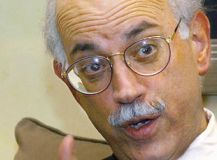US sees progress on Darfur solution, peacekeeping
April 29, 2007 (TRIPOLI) — The United States said on Sunday that Sudan was “falling in line” on accepting a major U.N. peacekeeping force for Darfur and welcomed progress at weekend talks towards a political settlement to the conflict.
 “There’s enough international pressure now and enough support from (Sudan’s) allies” for such a force, Andrew Natsios, Washington’s special envoy on Darfur, told Reuters, citing Egypt and China in particular.
“There’s enough international pressure now and enough support from (Sudan’s) allies” for such a force, Andrew Natsios, Washington’s special envoy on Darfur, told Reuters, citing Egypt and China in particular.
He said there was now a “broad international movement” behind the deployment of a so-called “hybrid force” of more than 20,000 U.N. and African Union peacekeepers and police in the western Sudanese region where four years of fighting have killed at least 200,000 people and displaced some 2.5 million.
“The Sudanese have been resisting it, but gradually on that front they’ve been falling in line,” Natsios said in a telephone interview from the Libyan capital Tripoli after talks on Darfur involving the United Nations, African Union and more than a dozen countries.
A joint communique from the talks, where Sudan was represented by its foreign minister, said sustained funding was needed for the 5,000 AU peacekeepers now in Darfur until the transition to the “hybrid operation” took place.
The United States accuses Sudan of allowing genocide to take place in Darfur, and President George W. Bush has told Khartoum it has one last chance to accept the full U.N.-AU contingent or face international sanctions.
Sudan has so far agreed to accept just 3,500 U.N. military and police personnel on top of the overstretched AU force, one of whose officers acknowledged last week that Arab militia in Darfur were killing and pillaging with impunity.
HUMANITARIAN CATASTROPHE
The conflict between rebels, government forces and the militia, known as Janjaweed, has triggered one of the world’s worst humanitarian crises.
Natsios said the talks in Libya had deliberately kept away from the peacekeeping issue and focused instead on delivering a plan for a political settlement under the umbrella of the AU and U.N.
“We all agree…that while the peacekeeping operation is essential, we want to raise the visibility and importance of the political negotiations up to the same level,” Natsios said.
One of the key obstacles has been that the Darfur rebels themselves are split. A peace deal in May last year was signed by only one of three rebel factions.
Until now, diplomats and analysts say, competing initiatives including from regional players like Libya and Eritrea, have enabled the rebel factions to stall by playing off one side against the other.
The joint communique, entitled the “Tripoli consensus”, said the talks “agreed on the need for convergence and coordination of all these initiatives under an AU-U.N. lead”.
“I would call it steady progress,” said Natsios, declining to use the term breakthrough.
Libya’s Africa minister Ali Treiki said a mechanism was needed to bring together first the neighbouring countries affected by the crisis — Sudan, Libya, Chad and Eritrea — and then the Sudanese factions which had not signed the peace deal.
He said such meetings should take place in Tripoli within the next three weeks. It was not immediately clear how the rebel groups would respond.
This weekend’s talks brought together the U.N., AU, Arab League and European Union with ministers or officials from Libya, Sudan, Chad, Egypt, Eritrea, the United States, China, Britain, France, Russia, Canada, Norway and the Netherlands.
(Reuters)
